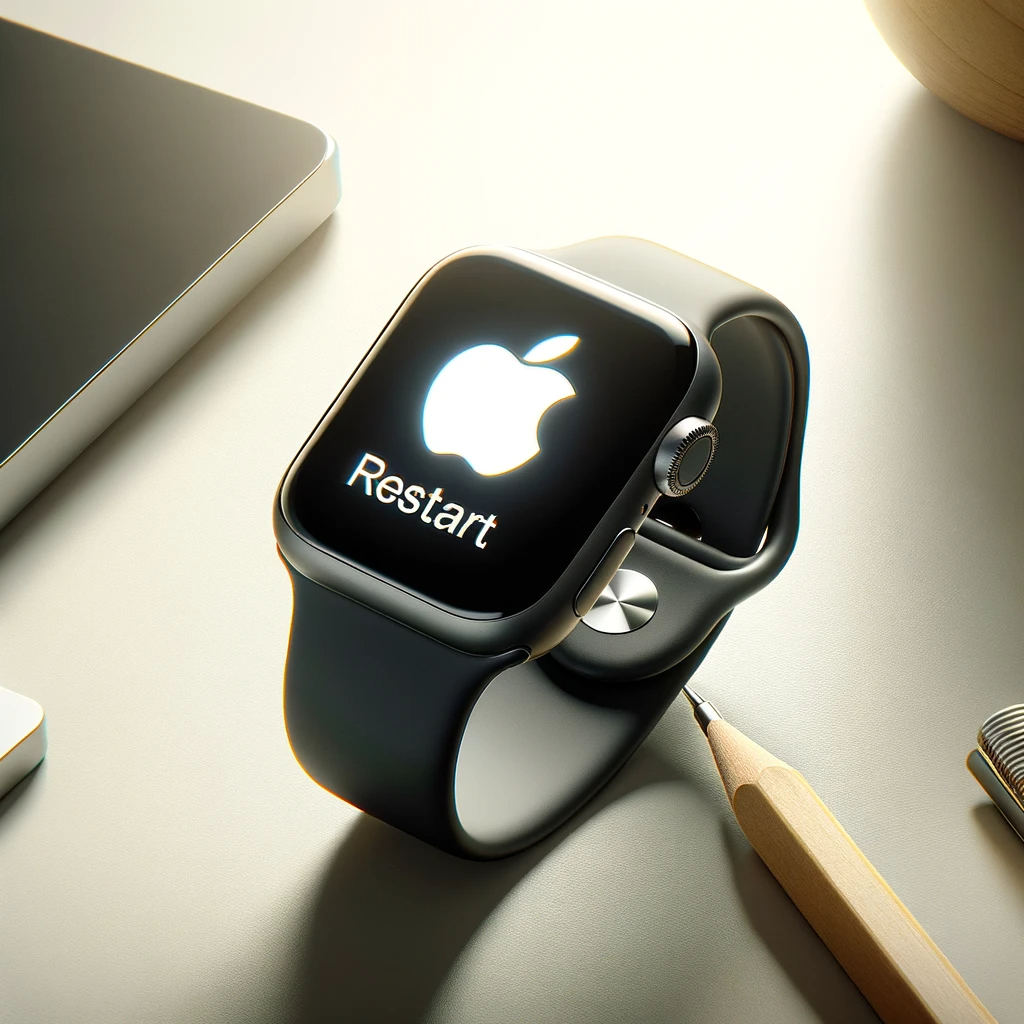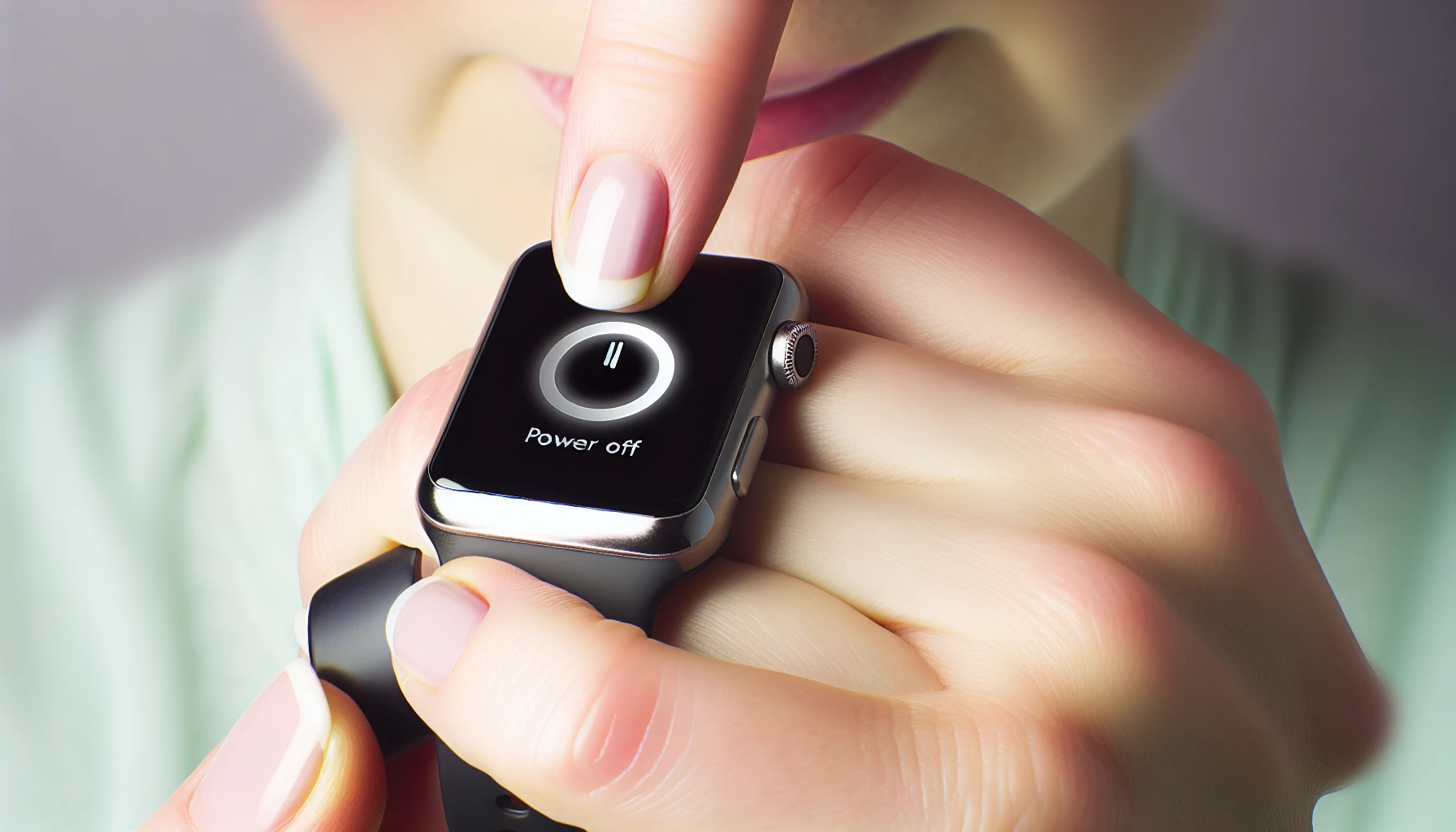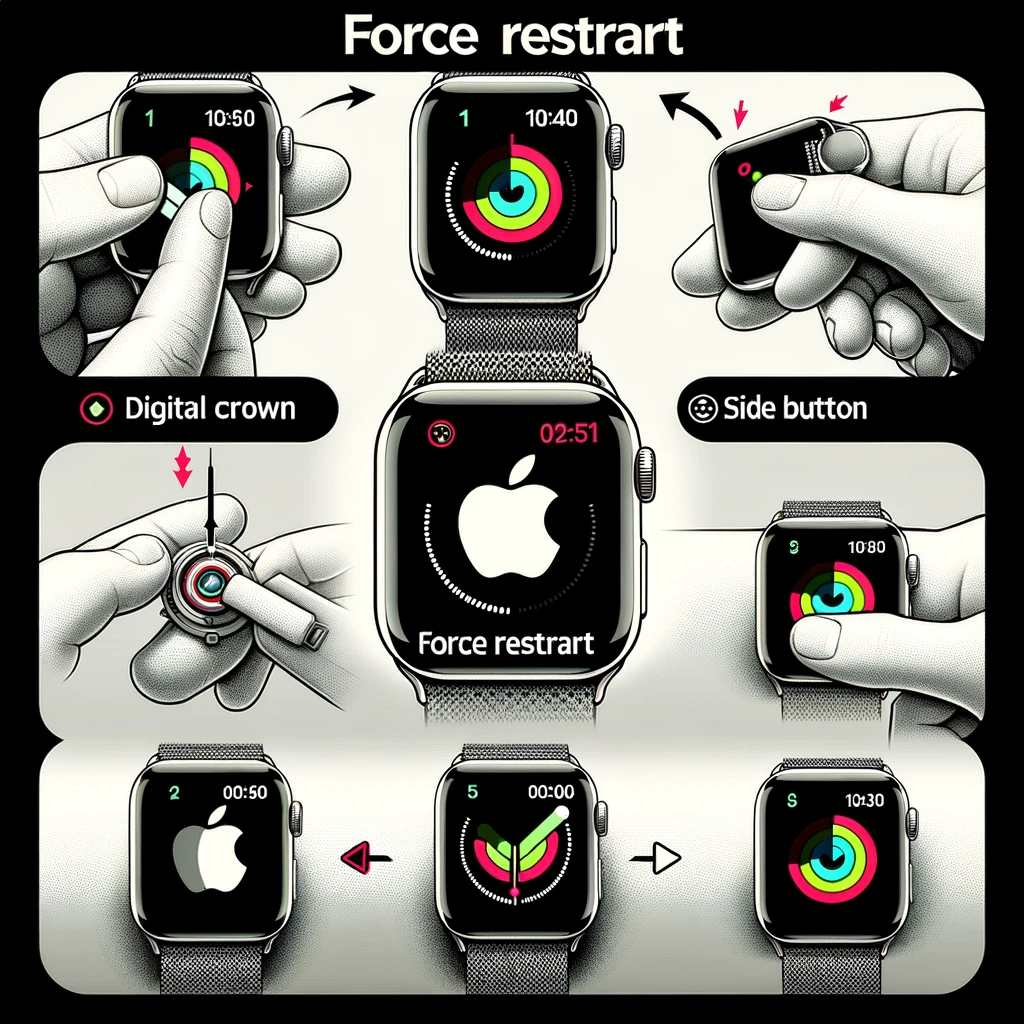Quick Guide: How to Restart Apple Watch Effortlessly

Imagine you’re in the middle of a workout, tracking your progress on your Apple Watch, when suddenly, it freezes. Frustrating, isn’t it? Fear not, as there’s an easy solution: learning how to restart Apple Watch. In this blog post, we’ll guide you through the different ways to restart your watch, from regular restarts to force restarts and even resets. You’ll learn when to use each method, how to perform them, and how they can help you get your watch back on track in no time.
Key Takeaways
- Understand the different types of restarts and when to use each one for optimal performance.
- Regular restarting is recommended weekly, a force restart can fix unresponsiveness but may lead to data loss, and resetting should be used as a last resort with necessary precautions taken beforehand.
- Steps include removing from charger, pressing side button until Power Off slider appears, swiping right on the slider & holding side button to turn back on.
Understanding the Apple Watch Restart Process

Restarting your Apple Watch is a useful way to address minor issues or improve its performance. There are three types of restarts, such as regular restart, force restart and resetting the watch. Each one has their specific purpose. It’s important to understand the differences between these methods in order for you to be able to select which type of reboot will serve your needs best.
Regular Restart
To ensure optimal performance and address issues such as sudden restarting, unresponsiveness or software malfunctions on your Apple Watch, a regular reset is an effective yet non-intrusive solution. This type of restart wipes the device’s system cache, which consists out of old data, and refreshes its software. It won’t delete any saved apps or information stored on the watch before doing so. As suggested by Apple Inc., this process should be done once weekly to guarantee that everything functions properly at all times without losing valuable info in between resets.
Force Restart
When your Apple Watch is unresponsive or not working, a regular reboot may be insufficient. A force restart then becomes necessary and won’t cause any damage to the device. It’s advised that this last resort option should only be used when essential as some data could get lost in process. To start anew with an apple watch, press down on both the side button and Digital Crown for at least ten seconds until you see an Apple logo appear. Release all buttons once such symbol pops up on the display screen of the watch.
Resetting Apple Watch
A reset should be a last option to consider if you want your Apple Watch restored back to its factory settings, completely erasing all content and configuration on the watch. Although this will delete everything from the device, your Health and Activity data stored in iPhone (not on the smartwatch) remains intact. For safety purposes, another backup of Apple Watch is made before eradicating any information. It allows for preserving recent details priorly saved onto it. Also Read: AI In Healthcare.
Steps to Restart Your Apple Watch

To initiate a regular restart on your Apple Watch, start by removing it from the charger. Then press and hold the side button until you see the Power Off slider appear. Swipe right on this to turn off your watch. Then, to power back up again simply press and hold down that same side button until you can spot an Apple logo reappear.
Removing Apple Watch from Charger
Prior to restarting your watch, make sure it’s not connected to the charger in order for the process of rebooting smoothly and avoiding any hindrances that could occur if linked while going through this procedure.
Holding the Side Button
The side button of an Apple Watch has several uses, such as summoning contacts and activating Apple Pay with double-pressing. When pressing the power button for a longer duration, you will witness the Power Off slider appear shortly on screen. Make sure to be extra careful while doing so since mistakenly clicking any other buttons like Digital Crown may cause unintentional actions on your watch device. Keep in mind that all keywords - apple watch, digital crown, power button, etc. should remain unchanged when using this feature provided by Apple Incorporated.
Swiping the Power Off Slider
To power off your Apple Watch, just slide the Power Off slider to the right. You should expect around 30 seconds for it to be shut down. Should you change your mind and choose not to turn off your watch after all, pressing firmly on the sliding control and keeping it held will cancel out this process before any action is taken by Apple’s device.
Turning Apple Watch Back On
Press and hold the side button on your Apple Watch to restart it. This will wake up the device, and you’ll see its time as well as watch face displayed on the screen, a confirmation of successful reboot process being completed.
How to Force Restart Your Apple Watch

If a regular restart of your Apple Watch isn’t successful in restoring its normal functioning, then it may be necessary to do a force restart. To do this, take the watch off its charger and press and hold both the Digital Crown button plus the side button for 10 seconds at once.
Ensuring Watch is Off the Charger
It is crucial to make sure that your Apple Watch isn’t plugged in for charging before performing a force restart. This guarantees the success of the process and sidesteps any possible issues which may arise if it were connected with its charger while attempting such action.
Pressing Digital Crown and Side Button
Hold down the Digital Crown and side button of your Apple Watch simultaneously for 10 seconds or more to forcibly restart it. When you do this, an Apple logo will appear on the display indicating that a force reboot has been initiated correctly and is in progress.
The relevant key words here are: apple watch, digital crown, press & hold, side button plus restarting via forcing – so these should all be maintained during any changes made to original text.
Troubleshooting Common Apple Watch Issues
Sometimes a restart of your Apple Watch isn’t enough to solve an issue, so you may have to troubleshoot by restarting the iPhone paired with it and checking if its power mode is in Low Power Mode or Reserve. Through this process, you’ll be able to pinpoint what’s causing the problem and find out how best to fix it.
Restarting Paired iPhone
Restarting your iPhone which is paired with an Apple Watch can help you address a number of issues, like connection problems with Bluetooth devices, freezing or black screen on the watch face and unpairing difficulties. To restart it press and hold the side button until the Power Off slider appears then slide to right in order for the device to reboot. This process should ensure better performance between both devices.
Checking Low Power Mode or Power Reserve Mode
To see if your Apple Watch has Low Power Mode or is in the process of entering Power Reserve, you can swipe up from the bottom of its screen to access Control Center and tap on its battery icon. If it’s in Low Power Mode, pressing and holding down the side button for roughly 10 seconds should cause a restart with an Apple logo appearing afterward. This will exit out any saved power mode as well as reboot your watch altogether. By taking these steps, you’re ensuring that all functions are enabled while making sure not too much energy gets wasted by having everything turned off due to low batteries!
Apple Watch Restart vs. Reset: When to Use Each Method
When it comes to the Apple Watch, knowing when and how to restart is key. A regular restart can refresh your watch and fix minor issues while a force restart should be used if the device has become unresponsive or isn’t working correctly after normal resetting fails. It’s important not to consider reset as an initial option since this will delete all content on your Apple Watch, but rather only as a last resort solution.
Regular Restart
It is suggested to do a regular reboot of your Apple Watch once every week for maximum performance. This straightforward process can be used to address common issues such as: connectivity problems, app glitches and display difficulties that may lead to decreased battery life or slower speeds on the device.
This restarting procedure will help make sure you are receiving all the advantages from your watch by ensuring it works effectively and productively in everyday use. By doing so, any minor troubleshooting requirements can easily be resolved, allowing you freedom without disruption caused by technical faults!
Force Restart
When regular restarting of Apple Watch is not successful in resolving an issue, such as freezing or boot loops, a force restart needs to be done. Data loss may occur if the user performs this action. It can address charging issues and any other unresponsiveness problems with the watch. Remember that only use a forced reset when absolutely necessary on your Apple Watch.
Resetting Apple Watch
When trying to troubleshoot an issue with your Apple Watch, it is essential to take certain precautions in advance. This includes backing up the watch and unpairing it from its paired iPhone. If other solutions fail, resetting may be necessary. This will remove all content as well as settings on the device but create a new backup of your data on the associated iPhone so that no information gets lost.
Summary
To troubleshoot any issues that may arise with an Apple Watch, it is essential to be knowledgeable in the difference between restarting, forcing a restart and resetting your device. The ability to manage these three techniques properly will give you the power to effectively deal with all problems related to your watch. When facing any difficulties relating this type of product from Apple’s catalogue remember: learn when each option should be employed so that you can get back on track quickly!
Frequently Asked Questions
How do I reset my Apple Watch and start again?
Open the Settings app on the Apple Watch to go to General > Reset. Then press ‘Erase All Content and Settings’. If it is equipped with cellular service, you’ll be asked if you wish to keep or discard your plan prior to resetting the watch. Afterward, carry out setting up again when this process has been finished.
How do I reset my Apple Watch to pair with my iPhone?
To pair your iPhone to an Apple Watch, open the dedicated app on the phone. On General settings, select Reset and hit Tap. Choose ‘Reset Sync Data’ which clears all data already transferred between both devices, then follow the prompts for reconnection of the two items from Apple. It’s easy, just tap away!
How do I restart my Apple Watch if it's dead?
To reset your Apple Watch, press and hold the side button together with Digital Crown for 10 seconds until you see the iconic Apple logo. Release both buttons when it appears to restart your watch successfully.
How do I force restart my Apple Watch?
To force restart your Apple Watch, press and hold both the side button and Digital Crown for at least 10 seconds until the Apple logo appears. Release the buttons then sign back into your watch when prompted.
How often should I perform a regular restart on my Apple Watch?
To keep your Apple Watch functioning at peak performance, it is recommended to perform a regular restart on the watch approximately once per week. This will ensure that all of its functions will be fulfilled.